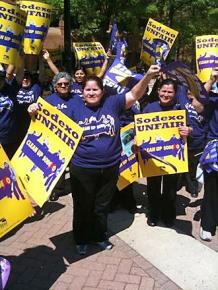A show of solidarity against Sodexo
reports on the strike of Sodexo food service workers at George Mason University--and why their struggle for justice is drawing strong support.
APPROXIMATELY 50 food service workers went on strike at George Mason University (GMU) in Fairfax, Va., on September 8, citing unsafe working conditions, low pay and mistreatment by management.
Bolstered by Service Employees International Union (SEIU) organizers, Sodexo workers from other states, and the new GMU student group Students for Workers' Rights (SWR), the strikers held a moving picket in the Johnson Center Plaza on campus, followed by a march that snaked up and down the upper campus.
Converging at the plaza for a rally, workers and SEIU organizers spoke out about the substandard, dangerous conditions at Sodexo's on-campus work sites, which include all kitchens and food prep areas at the university. Blown-up photos of workers' injuries, bearing the slogan "Working for Sodexo Shouldn't Hurt," were held aloft during a mix of chants, aired grievances and calls for Sodexo to change its practices or be banned from the university.
Current employees of Sodexo from as far away as Atlanta and Columbus, Ohio, came to support the strike. They share the same grievances with Sodexo as their Virginia brothers and sisters, and also are currently working with SEIU organizers to hold their employer accountable for years of neglect, abuse and stagnant wages barely above the state minimum.

The following day, September 9, workers and organizers held a workers' speakout inside the campus cinema. Aggrieved workers took the podium to speak, in both English and Spanish, about their injuries, their encounters with aggressive and malicious bosses, and the woefully low pay and zero benefits they've received.
Virginia state senator David Marsden was present for a brief question-and-answer session and promised to contact the university to "make sure these issues are dealt with." He went on to add, "Hopefully, you [workers] will be able to achieve [your goals] by the actions you've taken...and I want this problem to be solved. I don't care how, as long as it's solved."
Faculty members, some in support of the strike, others acting only as observers, were also on hand, as were members of SWR.
ONE OF the more painful reports shared by workers came from Cristela Moreno, a Sodexo employee for 21 years who was recently cut by a machine so badly that she lost consciousness. She explained, through a Spanish-to-English interpreter, that only one protective metal safety glove is given to a worker operating a given machine; if a worker wishes to acquire a second glove, he or she must pay the company $25 out of pocket.
Operating such a machine, and with insufficient safety gear, Moreno severed the tip of her finger and passed out from blood loss. When she awoke, a manager was yelling at her to get up and to explain why she had been lying on the floor. When she asked her manager to call an ambulance to take her to the hospital, the bosses decided to have another worker drive Moreno instead.
Moreno also explained that even when workers are not at physical risk, they are still at emotional risk: more than once, a manager has shoved or otherwise antagonized a worker to the point of tears, leaving her fellow workers to console her and get her back to work.
SEIU has been working with Sodexo workers at GMU since last year; Occupation Health and Safety Administration complaints have been filed within the past two weeks. The workers are not unionized at this time, but seek to form a union in the immediate future.
George Mason administrators have met with workers and students to address the workers' demands, but have only promised to carry out an "independent investigation"--one that would carry the condition that, if and when an inspector would visit a work site, he or she would contact Sodexo management before the visit--thus giving individual supervisors time to correct or conceal any immediately visible safety issues.
The university retains the right to terminate its contract with Sodexo at any time, with six months' notice; at this time, contract termination is the primary demand of the workers and their allies among faculty and staff.
Were such a demand to be met, it is possible that workers would seek to be kept on in their current positions as state employees, rather than employees of a private corporation contracted by the state of Virginia.


